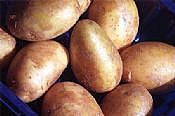How to Grow Potatoes in a Garbage Can
So for those of us who don't have much space in our


-
Step 1
 Grow new kinds you can't find at the grocery store.
Grow new kinds you can't find at the grocery store.Turn your garbage can upside down and drill several holes in the bottom of the can. Add a few around the outside wall, 3 to 6 inches up from the bottom. It's really important to have good drainage or your potatoes will rot in a hurry.
-
Step 2
 Good soil is the key ingredient.
Good soil is the key ingredient.Dump about 2/3rds of your bag of potting soil in the can. Mix in 1 cup of your fertilizer and set aside.
-
Step 3
 This potato could be cut into at least 4 pieces.
This potato could be cut into at least 4 pieces.For your seed potatoes, small ones can be planted whole. The larger potatoes should be cut up into pieces with no less then 3 "eyes" per piece ("eyes" being those brown dimples that the roots will grow out of). Let your potatoes dry out on the cut side before you plant them.
-
Step 4
Once your cut potatoes have cured, plant them in your can 5 inches apart and cover with the remaining soil. You'll only need 4 starts to a can. Set the can in an area that receives 4 to 6 hours of direct sunlight.
-
Step 5
Water thoroughly and keep the soil moist but not soggy during the growing season. Don't let the soil dry out or you'll end up with misshaped potatoes. On the hot summer days, your potato garbage can might even need to be watered daily (you might move the can to a slightly shadier location on the hottest days).
-
Step 6
 Potato flowers.
Potato flowers.As the plants start to grow in the can, mound up compost around plant stems keeping the leaves uncovered. They grow a little more, add some more compost. You'll be able to fill up the entire can with compost by the end of the growing season. Keep it watered.
-
Step 7
 Fall harvest.
Fall harvest.At harvest time, you can wait for the flowers to start to fade and grow what looks like berries. Harvest a few potatoes now, by reaching into the soft soil and picking a few, then covering everything else back up with compost. These early potatoes are "new potatoes" and they spoil quickly, so eat them now. For your bigger, storing potatoes, wait to harvest after the green plants have turned brown and dried up or died back. Just dump the entire can over (onto a tarp, maybe) and pick out your potatoes. The soil can be collected and added to a flower garden. You just don't want to plant potatoes, tomatoes, peppers, or eggplant in that potting soil/compost because the soil will likely harbor some insects or disease from this season’s crop.
Tips & Warnings
- I usually plant my potatoes around St. Patrick's Day (I'm in zone 8)
- Clean and dry your late harvest potatoes and store in a cool dark area (38 to 40 degrees).
- Store for up to 6 weeks depending on the variety.
- Practicing good crop rotation keeps soil born diseases from spreading and allows lean soils to naturally become rich with nutrients. Potatoes can pass on Verticillium, Sclerotinia, and scab in the soil that would infect tomatoes, peppers, eggplant, and other potatoes. Cabbage, lettuce, and herbs would happily grow in old potato crop soil.
- Potatoes absorb everything around them, so start out with healthy organic soils, fertilizers, and compost. Avoid pesticides.